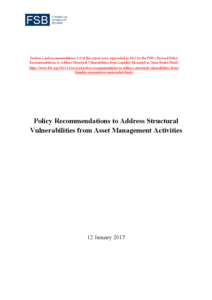Press enquiries:
+41 61 280 8138
[email protected]
Ref no: 1/2017
The Financial Stability Board (FSB) today published Policy Recommendations to Address Structural Vulnerabilities from Asset Management Activities. The document sets out 14 final policy recommendations to address the following structural vulnerabilities from asset management activities that could potentially present financial stability risks:
- liquidity mismatch between fund investments and redemption terms and conditions for open-ended fund units;
- leverage within investment funds;
- operational risk and challenges at asset managers in stressed conditions; and
- securities lending activities of asset managers and funds.
Asset management activities have increased significantly over the past decade, including through open-ended funds that offer daily redemptions to their investors. Such growth has been accompanied by increased investment in particular asset classes, which encompass some less actively traded markets. The trend towards greater market-based intermediation through asset management entities should enhance the efficiency, and contribute to the overall resilience, of the financial system. While historical evidence suggests that open-ended funds generally have not created financial stability concerns in recent periods of stress, growth in the sector and increasing holdings of less liquid assets by investment funds suggest that risks may have increased in recent years.
In the area of liquidity mismatch, the recommendations are designed to increase information and transparency to both authorities and investors with respect to open-ended funds as well as to strengthen liquidity risk management frameworks and practices of those funds. They also address the potential use of system-wide stress testing by authorities. Leverage recommendations focus on the measurement and monitoring of leverage within investment funds. The recommendation on operational risk would help ensure that risk management frameworks and practices are commensurate with the level of risks that an asset manager’s activities pose to the financial system. The securities lending recommendation focuses on situations where indemnifications are provided by asset managers to their clients in relation to securities lending activities.
The FSB published proposed policy recommendations for public consultation in June 2016. The final recommendations published today reflect a number of changes to the proposed recommendations to incorporate responses to the consultation. Among other things, the recommendations on liquidity have been revised to encourage authorities to develop consistent reporting requirements, to better distinguish the information that is useful to authorities and investors, and to emphasise the exploratory nature of system-wide stress testing at this time. The purposes and uses of leverage measures also have been clarified.
Mark Carney, Chair of the FSB, stated that “The growth in asset management activities provides new sources of credit and investment, and adds diversity to our financial system. The policy recommendations published today will enhance the resilience of asset management activities so that this form of market-based finance can help underpin strong, sustainable and balanced economic growth. This will be of lasting benefit to our collective economies.”
Daniel Tarullo, Chair of the FSB Standing Committee on Supervisory and Regulatory Cooperation, stated that “The policy recommendations will better prepare asset managers and funds for future stress events. The recommendations should also significantly enhance the information available to authorities for understanding potential risks from the asset management sector within and across jurisdictions.”
Ashley Alder, Chair of the IOSCO Board and a member of the FSB Steering Committee, stated that “The policy recommendations published today are an important step towards addressing potential financial stability issues in the asset management sector from a market-wide, activities-based perspective. IOSCO will take forward the recommendations on liquidity mismatch and leverage so as to enhance the overall soundness of this important financial sector.”
Notes to editors
The FSB’s work on asset management activities was launched in March 2015 as part of its broader efforts to build a resilient and open global financial system through promoting resilient market-based finance. This work has focused on: assessing recent changes in the structure of asset management activities; identifying and prioritising potential structural sources of vulnerability that could affect the global financial system; evaluating the role that existing policy measures could play in mitigating potential risks; and making policy recommendations as necessary. Separately, in July 2015, the FSB announced that it had decided to wait to finalise the assessment methodologies for non-bank non-insurer global systemically important financial institutions (NBNI G-SIFIs) until its work on structural vulnerabilities from asset management activities was completed. The focus, in the case of asset management, will be on any residual entity-based sources of systemic risk from distress or disorderly failure that cannot be effectively addressed by market-wide activities-based policies.
In June 2016, the FSB published a consultative document on proposed policy recommendations to address structural vulnerabilities from asset management activities. More than 50 responses were received to the consultation, which helped to shape the final policy recommendations. The complete list of policy recommendations can be found in Annex 1 to the report published today.
Some of the recommendations will be operationalised by the International Organization of Securities Commissions (IOSCO). IOSCO has been asked to complete its work on the liquidity recommendations by the end of 2017 and on leverage measures by the end of 2018. The FSB will regularly review progress in the operationalisation and implementation of the recommendations.
The FSB has been established to coordinate at the international level the work of national financial authorities and international standard setting bodies and to develop and promote the implementation of effective regulatory, supervisory and other financial sector policies in the interest of financial stability. It brings together national authorities responsible for financial stability in 24 countries and jurisdictions, international financial institutions, sector-specific international groupings of regulators and supervisors, and committees of central bank experts. The FSB also conducts outreach with 65 other jurisdictions through its six Regional Consultative Groups.
The FSB is chaired by Mark Carney, Governor of the Bank of England. Its Secretariat is located in Basel, Switzerland, and hosted by the Bank for International Settlements.
